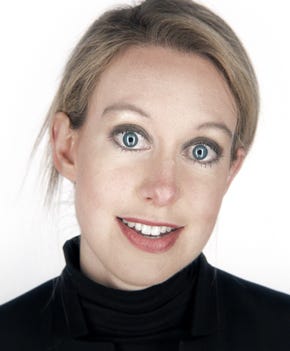October 16, 2015
Theranos had been one of the hottest startups in Silicon Valley. Now the company is seemingly under attack, facing tough scrutiny from both FDA and several press outlets--most notably the Wall Street Journal.
Qmed Staff
 One of the hottest startups in Silicon Valley, Theranos (Palo Alto, CA) is in full-fledged damage control mode after scathing press it received from the WSJ and other press outlets. The Journal questioned the accuracy of the firm's trademark finger-prick blood tests and, in its most recent article, reported that the firm has stopped using them for all but a single test.
One of the hottest startups in Silicon Valley, Theranos (Palo Alto, CA) is in full-fledged damage control mode after scathing press it received from the WSJ and other press outlets. The Journal questioned the accuracy of the firm's trademark finger-prick blood tests and, in its most recent article, reported that the firm has stopped using them for all but a single test.
Citing an unnamed former Theranos employee, the WSJ stated that the company allegedly failed "to report test results that raised questions about the precision of the [company's hallmark blood test known as the] Edison system. Such a failure could be a violation of federal rules for laboratories."
In recent press appearances and statements, Theranos founder Elizabeth Holmes has insisted that the company's technology is accurate, even revolutionary. It is for that reason that the medical establishment and press outlets like the WSJ are skeptical, according to Holmes. "First they think you're crazy, then they fight you, and then all of a sudden you change the world," she said in a recent interview with Jim Cramer's Mad Money.
Forbes' Matthew Herper fired back with an article titled: "Theranos' Elizabeth Holmes Needs To Stop Complaining And Answer Questions."
For its part, Theranos has criticized the WSJ's use of anonymous sources and released a statement on its website saying that its finger-stick technology only requires three steps:
1. Take a few drops of blood.
2. Put the blood in the Nanotainer tube.
3. Analyze the blood.
Having the FDA review the use of the Nanotainer, or step two outlined above, is part of a broader move to transition to completely using FDA standards guiding laboratory developed tests (LDTs) in CLIA-certified laboratories. The company says that its dealings with FDA, which include sharing price and product data with FDA, represents "unprecedented transparency."
Holmes said that Theranos sent the Journal more than one thousand of pages of documentation demonstrating that its reporting was incorrect. She claims that all of the sources tapped by the WSJ were either misquoted or that they were disgruntled former employers now working for competitors like LabCorp.
While Theranos hoped to dismiss the WSJ's article as "factually and scientifically erroneous and grounded in baseless assertions," other press outlets piled on, marking a stark contrast to the glowing press coverage the company has largely received to date. Holmes, who has been often been compared to Steve Jobs in media reports, even won glowing support from Vice President Biden, and has been featured in roundups of powerful innovators and billionaires.
But for now, the technology that made the company famous--a blood-testing system that works with only a drop or two of blood is used for a single test--for the herpes simplex virus, for which Theranos has received FDA clearance. The company is now using traditional blood testing equipment for the other 240 tests it offers. The WSJ also maintains that Theranos had been diluting many of its minute blood samples and then running them in conventional blood testing machines, such as those made by Siemens AG. In her interview with Jim Cramer, Holmes said the company is holding off on using its proprietary technology for lab tests other than herpes until it receives the greenlight from the FDA for those tests.
A Bloomberg interview with Intermountain director of endocrinology Joel Ehrenkranz, MD, stressed that it remains impossible for the public to determine the accuracy of the company's technology because the company is so tightlipped. "Theranos has refused to disclose their methods. They've never made their data public. They've not gone through the peer-review process," Ehrenkranz said. (A JAMA article published earlier complained of Theranos' advocacy of stealth science.) The company has received a lot of attention from medical experts "because their claims sounded too good to be true," he added. "Their claim that they can do 240 tests on a single drop of blood stretches credibility."
Yet Theranos is using a similar argument to deflect criticism, calling reports like the WSJ's article "full of falsehoods." Holmes said that she offered to demonstrate the accuracy of the company's technology in the WSJ's headquarters and it declined. In addition, it says it has sent presubmissions to FDA for more than 130 tests.
The company, which was named after an amalgam of "therapy" and "diagnosis," is also receiving attention for its the unique makeup of its board of directors, which includes three former cabinet secretaries (among them Henry Kissinger), two former senators, a retired Navy admiral, and a retired Marine Corps general. Among the other 12 people on the board, only one is a licensed medical profession, Bill Frist, while another, William Foege, MD, is a retired medical professional. The average age of the company's board members is 80.
The company does have support from powerful healthcare institutions such as the Cleveland Clinic and the Walgreens drug store chain, which uses Theranos technology in a number of its stories, primarily in Arizona.
Learn more about cutting-edge medical devices at Minnesota Medtech Week, November 4-5 in Minneapolis. |
Like what you're reading? Subscribe to our daily e-newsletter.
About the Author(s)
You May Also Like


